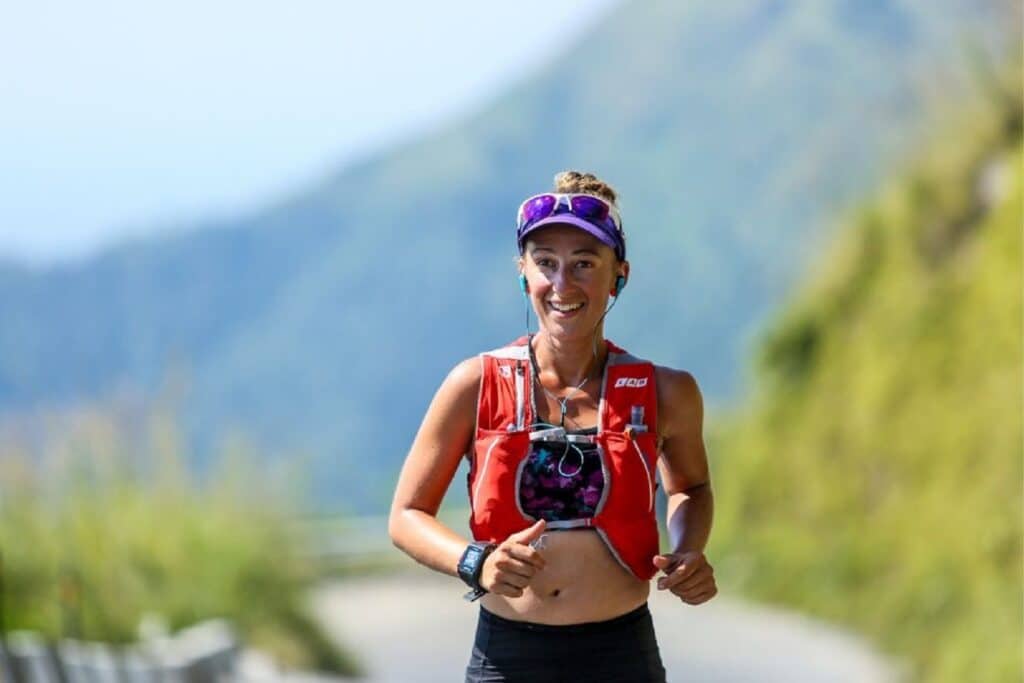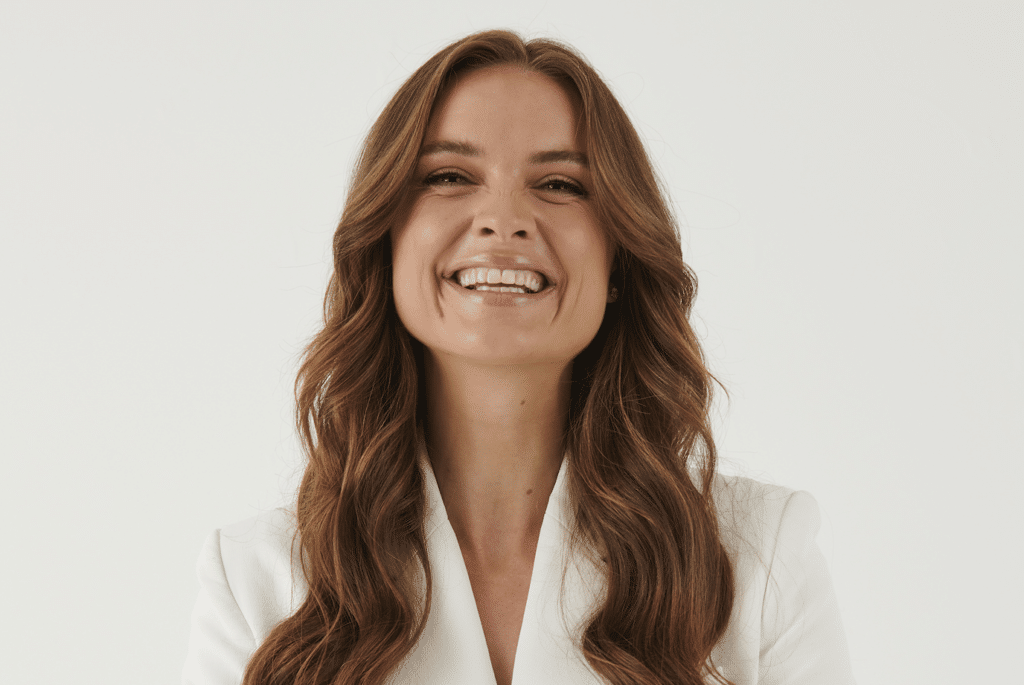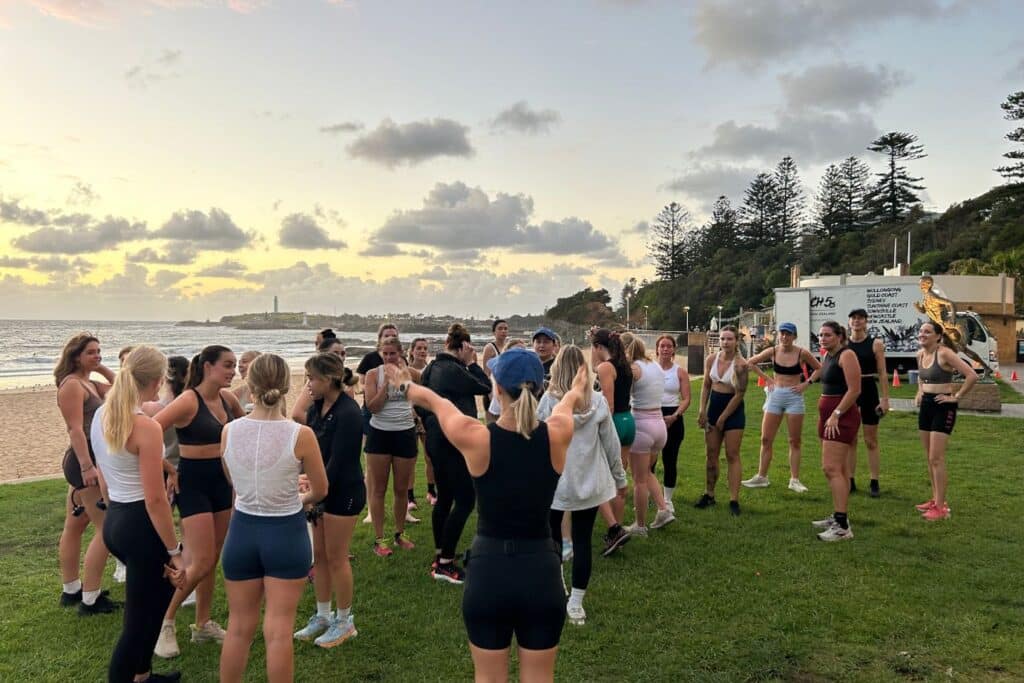It was pitch black at North Wollongong Beach, silent but for the waves crashing against the shore. There was a cool breeze and a slight sprinkle of rain. I found myself looking over my shoulder, scoping who was out, who might be behind me.
My sister was taking me to the meeting spot for Good Energy Run Club, an all-female group who meet every Tuesday and Friday morning before the sun rises to go for a morning jog together.
I couldn’t see many people there when we arrived, but it wasn’t long before a crowd of about 30+ women and girls gathered in a circle, talking with one another, wrapping their arms around themselves to keep out the chilling sea breeze.
Paige Pollard, the woman who began it all, stood in front of the group to get started. She has done this every Friday for the past year, since International Women’s Day in 2023. What started out as a group of around eight quickly grew to become a fierce army of 50+ women and girls.
Some are training for long running races, some are there to improve their fitness, and some are there for the coffee and chats that come after.
These days, it’s hard to have a conversation with a friend before they mention their run club, pull up their Strava stats and talk about how nice the sunrise was this morning.
But as cynical (and maybe a little judgemental) as I was prior to my run club experiences – not to mention freezing cold, wishing I could go back to bed – the significance of having a safe space to run as a woman is monumental, at a time where community connection is low, and alarmingly, the threat of danger running on your own is high.
Alas, it was time to find out for myself what a run club is all about – and why so many women and girls are doing it.
What is a run club?
It’s been 20 years since Paul Sinton-Hewitt, thirteen runners and three volunteers arrived at the very first Bushy Park Time Trial – what is now a global phenomenon known as parkrun.
Now, two decades on, runners around the world gather together every Saturday morning to go for a jog, anywhere between two and five kilometres. Parkrun operates in more than 2,200 locations across 23 countries.
I spoke to some people who occasionally attend parkrun events on a Saturday in various locations across Sydney.
On quiet days, just one Sydney parkrun can attract around 200 people. That’s a quiet day.
That number can reach up to 700 people – all running together, chatting together, connecting with one another.
So it’s safe to say run clubs are nothing new. But it’s also safe to say there’s been a recent surge in run clubs – particularly all-female run clubs.
Samantha Gash is the founder of Her Trails, a trail-based run club for women that began in Tasmania but now operates in several locations around Australia. She’s noticed increased interest in run clubs too.

“The surge in run clubs and communities, particularly in Australia, has spotlighted a growing interest in community-based fitness and the unique camaraderie it fosters,” Gash said.
“At Her Trails, our inception was driven not just by a passion for trail running but by a profound belief in the power of collective journeys in enhancing women’s physical, mental, and emotional well-being.”
Gash has witnessed firsthand why women show up to a Her Trail group run – and why they keep coming back.
“It’s not just about improving running times or distances,” she said. “It’s about the shared experiences, the encouragement, and the collective resilience.
“In Her Trails, we’ve nurtured a space where women empower each other, bridging the gap between isolation and community, turning hesitancy into confidence. We also see women quickly shatter previously held invisible rules and realise that far more is possible – on and off the trails.”
‘I felt like something was wrong with me’
Bridging that gap between isolation and community is a common theme in run clubs. The years of disruption and disconnection brought about by the COVID-19 pandemic has drastically affected how we interact with one another.
No one knows this better than Paige Pollard, founder of Good Run Club in Wollongong. She is originally from Wagga in rural NSW and moved to Wollongong in 2022, but after many failed attempts to connect with people in the area, Pollard considered packing up and leaving Wollongong.
“I felt like it was impossible to make friends here,” Pollard said. “I felt like something was wrong with me – I felt like I couldn’t connect with people.”
Before she did, however, she decided to try one last thing. On International Women’s Day in 2023, she launched the all-female Good Energy Run Club on Instagram, spreading the word with a few women she knew in Wollongong.
“I was scared no one was going to show up. It was pitch black. But eight girls showed up,” Pollard said.
It didn’t take long for the group to grow. The following week, thanks to social media, 16 women came. Then it was 20 the week after.
“Every week it was multiplying. It was crazy,” Pollard said.
Word got out, and suddenly, Pollard was witnessing exactly what she wished she had: like-minded women and girls connecting with one another. She wasn’t just witnessing it – she was a part of it.
“I think it’s the connection to community and being able to meet people that keeps them coming back,” Pollard said.
“A lot of the girls who come are here for uni and it’s a way to meet new people in a safe space. We also have a lot of international students, or people who work from home and have no way of meeting anyone.
“I think it’s really sweet when girls consistently show up and they form their own friends. It’s really sweet to see how that has grown.”
Stats on run clubs from Kic
I asked my connections on social media if they were in a run club with their local community. More than 130 people responded, and while only 20 per cent said they were in a run club, I had several people message me saying they weren’t but really wanted to join one.
Shortly after I saw these results, I had the overwhelming urge to go for a run myself. So I did.
According to me, I’m the furthest thing from being a “runner”: I feel that I’m much slower than everyone else, I get puffed out quicker and I talk myself out of going for a run with others.
It turns out I’m not alone. Laura Henshaw, the CEO and co-founder of fitness app Kic, surveyed 5,000 women in the community she has built through Kic. The survey found 59 per cent haven’t joined a run club. Why? 41 per cent fear they fear they are not fast enough, while 17 per cent found run clubs intimidating.

“When it comes to running as a whole, it’s so common for women in particular to have limiting beliefs holding them back,” Henshaw told Women’s Agenda.
“I’ve spoken with hundreds of women who have wanted to run, but don’t believe they’re a runner.”
That’s why Henshaw started the KICRUN program in 2021 through their mobile app. The program, which helps beginners start from scratch and build up to a 5km run, empowers people to overcome mental barriers of going for their first run.
“If they’re able to run, they are a runner,” Henshaw said.
But Henshaw and her co-founder, Steph Claire Smith, noticed there was something missing. From the moment the pair launched the KICRUN program, there was a huge demand for run clubs and women wanting to run with other women.
Kic’s recent survey of 5,000 women found 41 per cent have attended a run club, and it’s the motivation (62 per cent), sense of community (37 per cent) and boost in mood (25 per cent) that keeps them coming back week after week.
I could absolutely relate to those findings. That afternoon, when I went for a run on my own, I felt motivated, and I felt my mood had increased dramatically since the moments before my run, when I was lying in bed and considering staying there.
But while I was out, I thought about how nice it was running with my sister alongside me days earlier, running behind 30+ women and girls who showed up that Friday morning in Wollongong. I suddenly felt awfully alone.
This largely shared experience of women and girls encouraged Henshaw and Smith at Kic to start their very own run club together with New Balance, which kicked off at the end of March. There are currently six Kic run clubs operating across three different countries.
“It’s been incredible to witness,” Henshaw said.
“There were runners of all levels, no one was left behind, we laughed A LOT and built some beautiful new connections.
“Meeting our community and hearing about how Kic has helped them run further than they could ever imagine is so surreal. That’s what motivates me to keep going.”
Women and girls need a safe space to run
When considering the take off of run clubs in Australia, it’s difficult not to think about Samantha Murphy.
Two months ago, the 51-year-old from Ballarat went for her regular Sunday morning run and never returned home. Police allege she was murdered by 22-year-old Patrick Orren Stephenson.
Her alleged murder has sparked national conversations around the safety of women in situations as simple as going for a run.
Research from Adidas in 2023 shows 92 per cent of women feel concerned for their safety when running, with half (51 per cent) feeling afraid of being physically attacked.
The survey of 9,000 runners from nine different countries also revealed that 38 per cent of women have experienced physical or verbal harassment while running, and over half of these women have received unwanted attention, sexist comments or unwanted sexual attention, been honked at or followed.
Paige Pollard from Good Energy Run Club said running together as a group provides women and girls with a safe space to release stress, stay fit and stay connected with community.
“I can tell you there’s no way we feel like we could run in the dark on our own,” Pollard said.
“So coming to do those runs on darker mornings or evenings – it is a way to feel safe.”
There’s one more reason she gives me for why she keeps coming back to run club. Pollard simply points out to the sun, glittering on top of the ocean.
“And when we get good sunrises, that is always the selling point,” she says.
I heard the bubbly chatter from the women at Good Energy Run Club die down. I watched them hug goodbye, shout out “see you next week” and walk off to their cars, a spring in their step.
I smiled, staring out to the glittering horizon over the ocean. It was a pretty good sunrise.
I don’t know if it was the sunrise, the endorphins from running, the connection I felt with the community, or the coffee in my hand. But there was something about it that makes me want to go back.


